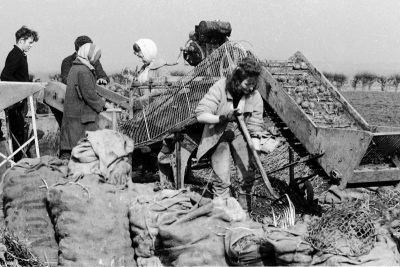Michael TRB Turnbull
The exploitation of Irish seasonal potato pickers was not a new phenomenon. In 1920, for example, Roman Catholic Bishop Grey Graham informed his clergy that a committee in Ireland had been investigating the question of housing potato workers, especially women and girls. However, in the spring of 1971, attention in East Lothian was focussed on the activities of 18 contractors or ‘gaffers’ who employed around 600 men and women in the potato fields.
Fr Michael Cassidy and Fr Michael Walsh of Dunbar became active in highlighting the plight of the potato workers, many of them, alleged Fr Cassidy, the victims of ‘old slave-type tactics’ (Scottish Catholic Archives (SCA), Irish Weekly (Scottish Edition), 15 May 1971, GD6/4/2) and intimidation, allegations which he gave substance to in a report (SCA, Gray, Cardinal G to Campbell, Secretary of State, 2 July 1971, DE132/15/1) submitted to Cardinal Gordon Gray of St Andrews and Edinburgh. As a consequence of this report, Gordon Campbell, Secretary of State, directed the Department of Agriculture’s Wages and Safety Inspectorate in collaboration with the Department of Health and Social Security to investigate the matter. East Lothian MP, John P. Mackintosh, Alex Eadie MP and Tom Oswald MP also took an active interest in the potato workers and what the press referred to as ‘slave camps’. Irish parliamentarian, Tom Harte TD, spent three days looking into their living conditions. In July 1971 a journalist, Gerry Brown, posed as a potato worker and reported: ‘My finger nails were cracked and bleeding, my hands ripped by stone fragments.’ (SCA, Brown G, News of the World, 18 July 1971).

In his report to Cardinal Gray, Fr Cassidy pointed to the employment of 14 year-olds recruited in Ireland. By now, the Irish authorities were poised to take action, Stephen Coughlan TD informing the Secretary of State for Scotland that bothies at Humbie Mill and Dunglass Mill were over-crowded and separate quarters for men and women not provided (SCA, Coughlan, S to Campbell, G, 8 October 1971, GD/6/1/13). The Dalkeith Presbytery of the Church of Scotland expressed grave concern at the ill-treatment of the workers (SCA, GD6/3/7). Meanwhile, Fr Walsh had established an escape-route back to Ireland and both priests had managed to repatriate 30 men with the help of money sent by a social service centre in the Irish Republic. Commented Fr Cassidy:
There are contractors who seem interested only in getting rich quick and the freedom and dignity of their workers means nothing to them. When they complain about the conditions the strong-arm men take over and men and women are assaulted and beaten to make them stay. They are too scared to go to the police – or even complain to the farmers on whose land they work. (SCA, GD6/14/7)
Although the police and the local authority were also actively involved, no prosecutions were brought. The relentless publicity, (including fictionalisation in a television detective series), eventually forced the gangers to upgrade their facilities and pay better wages. As for Fr Cassidy, (who had even received death threats), in 1992, he was honoured by the Irish government with the Irish Post Award for his services to his fellow-countrymen.